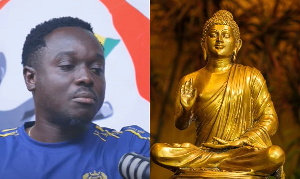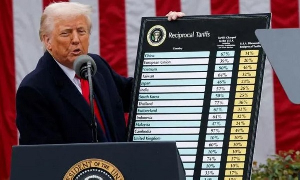**Kwabena Akurang-Parry, Ph. D.
“The only thing that Ghanaians probably do better than everybody else on our planet is to adopt a foreign culture and try to outdo the originators of that culture. The extent of our addiction to cultures other than our own is simply mindboggling.” Quoted from Nana Akwasi Twumasi, “Ghanaians and Wedding: Are We Losing Our Mind?” Ghanaweb Feature Article of Sunday, 23 August 2009. Using President Barack Obama’s visit as my unit of analysis, framed around and illuminated by relatable everyday stories and experiences, I offer some stories and incidences as reflections on Ghanaians’ huge appetite for all things foreign and distaste for our own way of life, indeed, what we may conceptualize as pathways of cultural genocide. Let me offer a brief caveat: the stories and experiences offered here, exemplified by Obama’s visit, do not present any precise chronology of our travels along pathways of cultural genocide. Rather, I have stitched together everyday experiences and stories to provide a cohesive account of what Kwame Nkrumah, among other things, theorized as neocolonialism and which Adu Boahen characterized as “colonial mentality;” indeed, both mirror the ways that Ghanaians dramatized Obama’s visit. In sum, we are so much taking in by foreign things to the detriment of our own culture and development as a nation. As a result, Ghana is now a Petri-dish in which the nurturing of one of the debilitating viruses of our time occurs: a tide of sustained self-fulfilling marginalization of Ghana/ians and by extension Africans as a whole.
More serious brands of such generic reflections, oftentimes deeply academic and rigorously philosophical, inform the ideas of Ephraim Amu, W. E. B. Du Bois, Frantz Fanon, Kwame Nkrumah, Chinweizu, Walter Rodney, and several others. Again such empowering meta-narratives have also found elegant homes in the evergreen works of African literary giants, including Chinua Achebe, Mongo Beti, Ferdinand Oyono, Ayi Kwei Armah, Camara Laye, and Ngugi wa Thiong’o. Additionally, lyrics of some revolutionary songs, for example, ably assembled by Nana Kwame Ampadu, Fela Ransome Kuti, and Bob Marley, have sought to privilege our African values and way of life in the face wanton neocolonialism and unidirectional conduits of globalization.
Excepting the attainment of independence in 1957, there is no doubt that no single celebratory event had focused so much global attention on Ghana than that of Obama’s recent visit to Ghana. Undoubtedly, most Ghanaians appreciated Obama’s visit; it made us proud, at least, knowing that Ghana is at the forefront of progress and stability in Africa. For those of us tucked away overseas, our gingerly hope is that the ways that the worldwide media showcased Ghana would enable our foreign hosts, at least, to fathom the spatial location of Ghana during casual conversations. In sum, the visit embodies moments of great possibilities and watersheds of excellence for the African world which Ghana championed during the heyday of the fruitful, empowering Nkrumah epoch.
At another level, and indeed, the focal point of this essay, Obama’s visit illustrates the tyranny of neocolonialism and how it has gripped the mindset of Ghanaians in farcical ways. During the visit, state-sponsored special cloth imprinted with Obama’s image went on sale. I would hazard that Ghana is the only place in the world where this could occur. Overnight, the American flag dominated masts everywhere and completely eclipsed the flag of Ghana. School children, as in the colonial era, were forced to stand in the intimidating sun to honor the presence of Obama as if he was a provincial governor on tour of duty in a backwater colonized nineteenth-century world. Also prepubescent females adorned with colorful traditional costumes flaunted their budding feminine assets as they danced to the de/cadence of politicized drums to welcome Obama. Unashamedly, members of Parliament and government officials, like children chasing butterflies in a playground, struggled among themselves to capture photos of Obama with their cell-phones. Again, this is something that could only happen in Ghana! Our chiefs/kings were not about to be outperformed in the political theatrics that heralded Obama’s visit. For instance, some chiefs rebuilt their durbar grounds, renovated palaces, re-groomed their political space, pressured the government to renovate dilapidated state buildings, retuned their state drums, compelled asafo mma [so-called companies] to practice their craft, etc. Sad to say that in the end, some of the chiefs did not even get the chance to see Obama. Above all, Ghanaians hoped that Obama would bring a magic wand to solve all their problems, indeed, what one commentator aptly called our dependency syndrome. In nursery school, one of the rhymes that was planted in our young, fertile minds was the best comes from the West. In the long-term, such nursery rhymes have come to stay and are manifesting in several prophetic ways through our own agencies and in/actions.
Simply put, it was expected that Ghanaians would showcase their proverbial hospitality during Obama’s visit and we did, but went overboard, hence the whole visit, to use a metaphorical stretch, was like the second coming of Christ in Ghana. Not surprisingly, an ordinary president of a backwater American college who visited Ghana years ago as a tourist was able to gain audience with the President of Ghana! A Ghanaian professor plying his trade in America took his students on a study-abroad trip to Ghana. At the Kotoka International Airport, Ghanaian immigration officers bypassed the grey-haired Ghanaian professor, who had introduced the group as his study-abroad students from America to the immigration officers, and asked the white teenage-students, to their surprise, about who was their real team-leader.
For the sake of analogical clarity, let us summon additional hyperbolic stories as our embroidery for emphasis. Ghanaians now celebrate mother’s day, father’s day, children's day, grand-parents’ old-age days, etc. There may be Chinese dog’s day in the pipeline. Very soon there will be Japanese chop sticks’ day and Italian pizza’s day. The American Flag and the Union Jack would soon become our national uniform! Valentine’s Day is now our national festival; paradoxically, we have abandoned our indigenous practices like story-telling, bragoru and dipo, which among others, taught the youth about love, respect, reciprocity and duty. Yes, we have latched onto Valentine’s Day that promotes capitalistic, orgiastic behavior. Certainly there is nothing wrong with celebrating these “global” days. The problem is that in the process of embracing foreign cultures and values, we continue to marginalize and abandon our local languages, communal values, festivals, ancestor reverence, rites of passage and so on that sustain our collective well-being and ontological harmony.
Indeed, at the center stage of our looming cultural genocide are our fascination for and unquestioned acceptance of all things foreign, especially “white superiority.” In 1997, I was traveling from Sekondi-Takoradi to Accra when we were told that a portion of the Beposo Bridge on the route had partially collapsed so all vehicles on both sides of the bridge had to stop for the necessary repairs to be made. After waiting for several hours, a team of engineers arrived to repair the bridge. I made my way to the bridge to see what was being done and heard my nickname “Agoro” echo off the bridge in the dimly-lit environment. To my utmost delight, three of the engineers were my school mates at the Presbyterian Boys’ Secondary School (PRESEC), Legon. But the happy encounter was quickly snuffed out of my system when I realized that the Ghanaian engineers were being supervised by two white men. Ironically, even in building local bridges (pun intended), we have to use the superior expertise of foreigners!
There are Ghanaians who have never been to the Ukraine, but have adopted some affected Ukrainian accents! American slangs are highly prized in Ghana. Just pick up the phone in the US of A, God’s own country in the estimation of Ghanaians, to speak with Ghanaians in Ghana and you would come across concocted American accents! Someone asked me whether I was calling from the US of A because my accent was still Ghanaianized, but before, I could respond, his adopted American accent departed from him like the sun parting company with darkness! Our television and radio hosts mimic foreign accents as if they have had plastic surgery to replace their Ghanaian tongues. I recently watched a Ghanaian film that has a bumbling “Americanized” character who kept calling everyone in the film “Nigger” this or that. Ghanaians like to imitate anything foreign and we oftentimes overdo it: the fact of the matter is that even African American comedians and “gangster” rappers, who deployed the “N” word in recent times, have abandoned it. Rather surprisingly, the film was made in 2009.
In 2006, an Akuapem scholar eulogized his deceased father in Akuapem Twi, spiced with proverbs and symbols of local color, with the hope that the assembled mourners would admire his “native” eloquence! But in the end, he disappointed the teeming mourners who had come to feed on a menu of American accent(s) conjured by their native son who teaches in America! The fact that he was literate in Akuapem Twi did not matter! What would have mattered was his use of “gonna,” “wanna,” hey men,” “ya knaw,” even the N-word, etc.! You bet the disappointed family queried their son about why he had used Akuapem Twi in elegizing his deceased father, and he told them that Westerners spoke their own languages at funerals. The son’s brief, but apt response, was paradoxically conceived as a signifier of too much education, and in the parlance of Ghanaians, he was “too known.”
Not surprisingly during the celebration of the 50th Anniversary of Ghana’s independence President J.A. Kufour entombed himself in some Italian-made and carpenter-built suit, with a flaunting nineteenth-century Victorian imperial waistcoat to match. It was as if President Kufour wanted to remind the former imperialists, euphemistically called “colonial powers,” that Ghanaians still looked up to them for leadership! The irony of it all is that foreign dignitaries adorned the Ghanaian kente! Well, on that day, Nkrumah turned in his grave and confronted the African elite that are now hegemonizing and privileging Western cultures! Anyone who has seen photos of our founding fathers and mothers, whose period spanned the golden age of decolonization from the late 1940s to about 1966 when the overthrow of Nkrumah by the CIA-induced homegrown forces dimmed the splendid history of emergent Ghana, would admire their luxuriant batakari, agbaja, kente, ntama, etc. Today, our Parliamentarians, TV personalities, government officials, and even armed robbers show their stolen wealth and putative class by adorning oven-like woolen suits in spite of the mighty unrepentant sun that bakes Mother Earth in Ghana.
In order to develop, we have to source inspiration and empowerment from our indigenous cultures to serve as counter hegemonic philosophies. Indeed, we have to figuratively peel off the retrogressive wrinkles of neocolonialism and see Western cultures as mere compasses, devoid of divined self-fulfilling maps that always show the way to progress. Certainly, all societies are dynamic and go through phases of change predicated on renewal or decay and defined by the agency of continuity and discontinuity. Some Ghanaian sociologists and ethnographers, including Kofi A. Busia, G. K. Nukunya, J. M. Assimeng, Peter Akwasi Sarpong, and Kofi Asare Opoku, have shown that societies gain from diffusion of innovations and ideas that are osmotic worldwide at any given time, but that care is needed to sift through the various webs of change. For example, China and Japan have done remarkably well by plucking some good ideas from dominant, hegemonic cultures, but have also had the nationalistic capacity to reject fruits that are distasteful on the local tongue. For their part, African states and societies eagerly assimilate foreign influences which our neo/colonized mindsets epitomize as Western values synonymous with “civilization” and progress.
Oftentimes and rather paradoxically, the most educated people among us are the ones that construct and champion the pathways of cultural genocide. As noted, Boahen problematized this when he concluded that: “But the last and the most serious negative impact of colonialism has been psychological… colonial mentality among educated Africans in particular and also among the populace in general” (African Perspectives on Colonialism, p. 107-108). In sum, African states and societies continue to experience the effects of the Black holocaust – Atlantic Slave trade; European colonialism; what Kwame Nkrumah ably framed as neocolonialism; and now facets of hegemonic globalization beamed to Africans via Hollywood and the Internet to mention a few. These avenues of domination, however defined, have enticed Africans to engage in self-depreciation. Indeed, the evidence suggests that Africans have internalized the inferior status imputed to them by Arabs and Euro-Americans. We would be stating the obvious by concluding that the upswing of “colonial mentality” of Ghanaians today appears to be more gripping than it was at the dawn of independence in the late 1940s.
Certainly due to the tyranny of space, we can’t recount every story or incidence of cultural hegemony and its output of African self-depreciation, in fact, even self-hatred, which may be a variation on the above. Here and now, it is well to restate that there is nothing wrong with borrowing from other cultures. No society is static. In fact, change is a part of the human condition. Today, the processes of diffusion of innovations, ideas, cultures, etc. have been made easier via globalization, technology and rapid travel. What is wrong is our collective failure to look deeper into our ontological pot so that we can retain what would make our society more workable. We are hastily dismissing our way of life, while happily borrowing other people’s cultures even in some crusading and championing ways. The irony is that non-Africans look down upon African cultures: for example, local media accounts illustrate that the Chinese and Lebanese in Ghana think that they are better than Ghanaians. Perhaps those foreigners have come to learn that Ghanaians/Africans cherish foreign cultures and look down upon African way of life. We need to frame a coherent empowering agenda for our cultural renewal and that will form the subject of my next essay.
**Kwabena Akurang-Parry is Professor of History at Shippensburg University in Pennsylvania, USA. Apart from numerous essays and commentaries, he has authored over forty-five peer-reviewed articles on comparative slavery, colonialism, gender in Ghana/Africa. Among others, he is the co-editor of
Opinions of Wednesday, 26 August 2009
Columnist: Akurang-Parry, Kwabena













